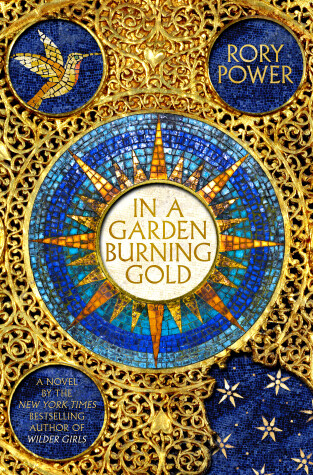
chymerra
When I got the invite for In a Garden Burning Gold, I was intrigued by the blurb. A book about near immortals who control the tides and seasons of their country? It was an immediate yes from me. I was super hyped to read another book by this author (having read The Wilder Girls), and I did expect something very similar to that book. But, this book was very different from that book.
In a Garden Burning Gold is the first book of the Argyrosi duology. This book lays the foundation of the different families, their powers, and how they came by them. It also explains a complex religious system. The author was kind enough to include a glossary at the beginning of the book that details the different families and countries. But, even with that, I still had an issue keeping people/countries straight.
The plotline for In a Garden Burning Gold was interesting. Rhea and Lexos are twins who serve their father in ruling their country. Each has a magical power: Rhea can control the seasons, and Lexos can control the tides and stars. Their father uses their powers to his advantage. Rhea is married several times a year and uses her husband to usher in the seasons as a human sacrifice. Lexos only controls the stars and tides when directed by their father. But there has been stirrings of unrest in their country and other countries. As Rhea is married off to the only son of a northern ruler, Lexos is left behind to deal with his father’s increasingly erratic behavior. But some secrets will impact Rhea and Lexos’s relationship with not only each other but their father. These secrets are explosive and could rewrite everything they thought they knew about their family. But are Lexos and Rhea willing to let that happen?
I am going to put a trigger warning in this review. I usually don’t, but I feel that certain situations in the book warrant it. Per the author’s post on her blog, these triggers are emotional and physical abuse by a parent, death, manipulation/discussion of loss of agency, discussion of state violence and war, a history of imperialism, and mention/description of blood. If any of these could potentially trigger you, I highly suggest not reading this book.
Out of all the characters in In a Garden Burning Gold, Rhea was my favorite. She wasn’t a precisely likable character, but I loved seeing her evolve from a self-centered, father-pleasing woman to a woman who embraced everything about herself and found the courage to become who she was destined to be. It was like watching a butterfly emerging from a cocoon, it was a little painful to read, but the result was terrific. I am curious to see what she will do in book two since she has embraced her mother’s legacy.
I wasn’t that fond of Lexos, on the other hand. Outside influences easily led him (certain scenes with the ruler of a different country showed that), and he was terrified of his father. Now that I understood. His actions were directly related to his fear of his father. So, I was surprised when he decided to do what he did in the second half of the book. He meant well, but I wasn’t surprised when it blew up in his face. I also wasn’t surprised when Rhea had the reaction that she did.
The younger siblings intrigued me. I thought Nitsos’s powers were terrific (even if his father didn’t). I wanted the author to explore his character a little more. But I feel that he will become a significant player in the second book. Chrsyanthi was an enigma. I couldn’t quite place her power (it was something to do with paint), and I hope that the author thoroughly explains it in book 2. I could have missed it, but I expected her power to be very obvious.
The storyline with Rhea being Thyspira was engrossing. I was fascinated by the fact that she needed to have a sacrifice to bring about winter and summer. It made me wonder how human sacrifice was brought into play and if the author would explain that in book 2. I also loved how it evolved. I can’t say anything without giving away spoilers, but I will say that I found it very fitting.
Lexos’s storyline was also exciting, but I was a little bored by it. I am not a hugely political person, so the talk about overthrowing rulers bored me a little bit. But it did get interesting towards the end of the book. I can’t wait to see where Lexos ends up in book 2.
The end of In a Garden Burning Bright was exciting. Again, I can’t say much about what happened, but I will say that I agree with what Rhea was doing. I didn’t quite agree with the other thing she did, but I understood why she did it. It hooked me in for the next book.
I would recommend In a Garden Burning Bright to anyone over 21. There are several triggers (see above). There is also mild language, violence, and non-graphic sexual situations.

